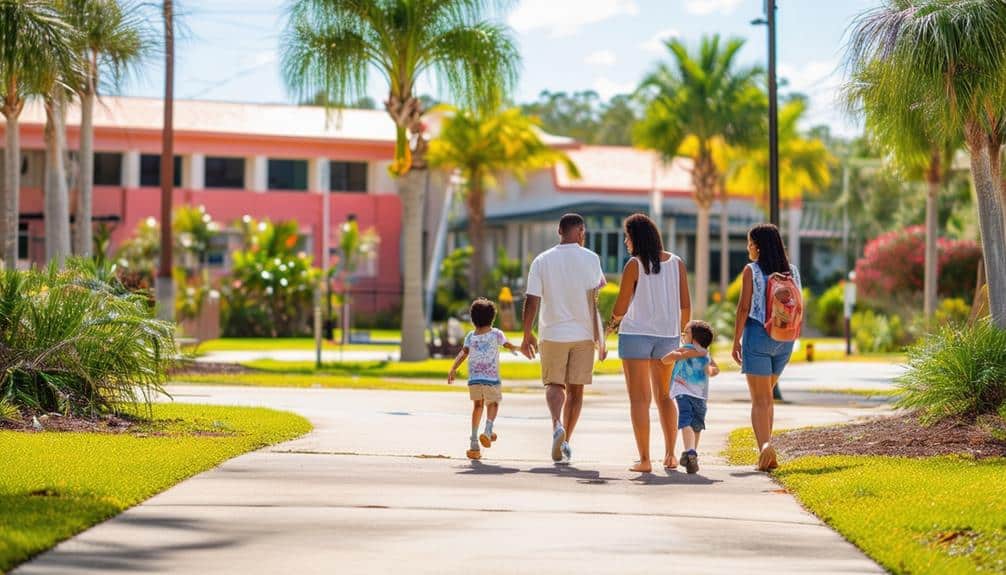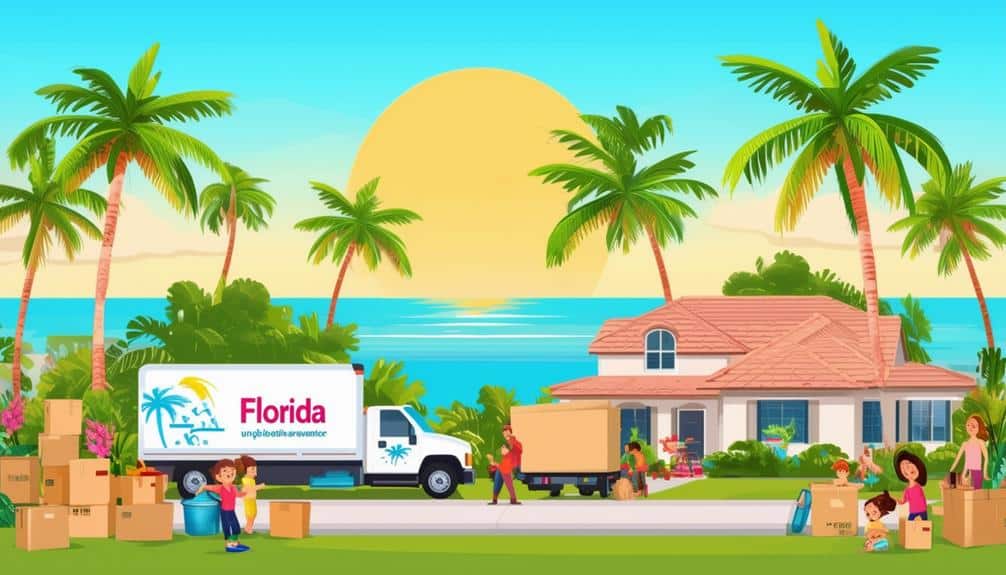Key Takeaways
- Research schools, neighborhoods, and local amenities thoroughly before moving.
- Create a well-structured moving checklist to stay organized.
- Plan for Florida’s weather by preparing for humidity and hurricane seasons.
- Update necessary documentation like driver’s licenses and vehicle registrations promptly.
- Engage with local communities to explore educational options and build connections.
Essential Points to RememberPlan Ahead
Planning is crucial for families relocating to Florida to ensure a smooth, stress-free shift. Families can mitigate last-minute stress and delays by taking proactive steps, providing a seamless shift. An all-encompassing approach begins with thorough research into schools, neighborhoods, and local amenities. This foundational knowledge helps families feel more connected and at ease in their new environment.
A well-structuredmoving checklist is an essential tool for staying organized. This checklist should include all tasks, from minor details like changing addresses to significant undertakings like hiring movers. Assigning deadlines to each task can keep the process on track and prevent overlooked responsibilities.
Equally important is setting a realistic budget for the move. This financial plan should account for all potential expenses, including moving services, temporary housing, and travel costs. A well-planned budget helps families avoid unexpected financial surprises, allowing them to focus on settling into their new home.
Additionally, anticipating challenges such as finding healthcare providers can further ease the shift. By addressing these aspects early on, families create a solid framework that supports a successful relocation, fostering a sense of belonging in their new Florida community.
Understand Local Weather
Understanding Florida’s local weather is essential for a smooth relocation. It is crucial to be prepared for the high humidity and heat during the summer and have a robust hurricane preparedness plan. Moreover, families can enjoy the benefits of year-round sunshine and mild winters, making outdoor activities possible throughout the year.
Prepare for Humidity
Adjusting to Florida’s high humidity levels, ranging from 60% to 90%, is essential for maintaining comfort and well-being. We’ll explore some practical tips that can make this adjustment smoother. First, understanding that humidity can make temperatures feel notably hotter is critical. That little extra moisture in the air increases discomfort, so staying hydrated and wearing breathable clothing becomes vital.
Frequent rain showers and thunderstorms are common in Florida, especially during summer, which can further elevate humidity levels. Ensuring your home is well-ventilated can help mitigate the effects of this humidity. Regularly using dehumidifiers and air conditioners will keep your living space comfortable and help prevent mold growth, a common issue in high-humidity environments.
For outdoor activities, plan your day around the cooler, less humid parts of the day, typically early morning or late evening. Additionally, understanding how humidity impacts daily activities and taking small steps to adjust can significantly affect your comfort and enjoyment of Florida’s distinctive climate. Embracing these measures will help you and your family feel more at home in your new surroundings.
Hurricane Preparedness Plan
As you acclimate to Florida’s humidity, it’s equally important to be prepared for the state’s hurricane season, which runs from June to November. A robust hurricane preparedness plan guarantees your family’s safety and protects your property. Here are some critical steps to help you navigate this period with confidence:
- Stay Informed: Regularly monitor local weather updates and emergency alerts. Knowing the latest information will help you make timely decisions.
- Evacuation Plan: Familiarize yourself with local evacuation routes and procedures. Plan multiple routes in case primary roads are congested or closed.
- Emergency Kit: Assemble a detailed emergency kit. Include essentials like water, perishable food, medications, important documents, flashlights, and batteries.
- Home Preparedness: Secure your home by installing storm shutters, trimming trees, and reinforcing garage doors. Consider investing in a generator to maintain power during outages.
- Insurance Check: Review your homeowner’s insurance policy to ensure it covers hurricane-related damages. Understanding your coverage can save you from financial stress after the storm.
Year-Round Sunshine Benefits
Florida’s year-round sunshine, with an impressive average of 237 sunny days annually, offers residents and visitors ample opportunities to engage in various outdoor activities and enjoy a vibrant lifestyle. The state’s tropical climate guarantees warm temperatures throughout the year, with average highs ranging from 70°F in winter to 90°F in summer. This consistent warmth makes it possible to plan beach outings, family picnics, and outdoor sports activities without the interruptions of a harsh winter.
Understanding local weather patterns is crucial for newcomers. Florida experiences a rainy season from June to September, characterized by brief but intense afternoon thunderstorms. Furthermore, the hurricane season, spanning from June to November, requires that families stay informed and prepared. Despite these seasonal weather events, Florida’s mild winters are a significant draw, as temperatures rarely drop below 50°F in the southern part of the state, providing a welcome escape from colder northern climates.
Embracing the benefits of Florida’s sunshine allows families to enjoy a healthier, more active lifestyle. From beach days to hiking and boating, the options are endless. The state’s climate promotes a sense of community, encouraging outdoor gatherings and activities that create lasting bonds.
Research Neighborhoods

When researching neighborhoods in Florida, it is essential to consider factors such as school districts, safety, and available amenities to ensure the best fit for your family’s needs. These elements ensure smooth change and long-term satisfaction in your new community.
To thoroughly evaluate potential neighborhoods, consider the following:
- School Districts: Research the ratings and reviews of local schools. Education quality can significantly impact your decision, especially if you have children.
- Safety: Review crime statistics and safety reports. A secure environment is essential for peace of mind and overall well-being.
- Amenities: Investigate the availability of parks, recreational facilities, shopping centers, and healthcare services. These amenities contribute to a higher quality of life.
- Property Values: Understand current property values and market trends. This can give insight into the neighborhood’s economic stability and future potential.
- Community Insights: Utilize community websites, local forums, and social media groups. These platforms provide firsthand information and experiences from current residents.
Update Documentation
When relocating to Florida, updating your documentation is an important step that includes transferring your driver’s license, meeting school enrollment requirements, and completing the vehicle registration process. To streamline these updates, gather all necessary documents, such as proof of identity, Social Security number, and residency proofs. Staying organized with a checklist can help you manage these tasks efficiently and avoid potential penalties.
Driver’s License Transfer
Transferring your out-of-state driver’s license to a Florida license is an important step that must be completed within 30 days of establishing residency. Ensuring you have the proper documentation and understanding of the process can make your changeover smoother. Here’s what you need to know:
- Required Documents: You must bring proof of identity, your Social Security number, and two documents that show your new Florida address.
- No Testing Required: If you hold a valid out-of-state license, you are not required to take a written or driving test, making the process quicker.
- Fees: Be prepared to pay a fee, which varies depending on the type of license you are transferring.
- Appointment Scheduling: Florida allows you to schedule an appointment online at your local DMV office, saving you time and streamlining the process.
- Timely Transfer: To avoid legal inconveniences, complete the changeover within 30 days of becoming a resident.
School Enrollment Requirements
After securing your Florida driver’s license, the next vital step for families with school-aged children is understanding the school enrollment requirements. Florida mandates that parents provide proof of residency, such as a lease agreement or utility bill, to enroll their children in public schools. Moreover, you must present your child’s birth certificate, immunization records, and social security number. Each school district may have specific enrollment requirements, so you must check with the local school board to ensure you meet all criteria.
Under Florida law, children must be enrolled in school by age six, although there are exceptions for homeschooling or private schooling. This legal requirement underscores the importance of familiarizing yourself with the enrollment process to avoid disruptions to your child’s education.
Navigating these requirements can feel overwhelming, but being well-prepared can make the process smoother. Start by gathering all necessary documents and contacting the local school board for guidance. This proactive approach will ease your move and help your family feel more connected and supported in your new community, fostering a sense of belonging in your new Florida home.
Vehicle Registration Process
Securing vehicle registration in Florida requires proof of Florida insurance coverage, a valid driver’s license or ID card, and vehicle identification number (VIN) verification for out-of-state vehicles. This process is straightforward but necessitates timely action to guarantee compliance with Florida law, which mandates registering a car within 30 days of becoming a resident or gaining employment in the state. Below are essential steps and considerations to guide you through the vehicle registration process:
- Proof of Florida Insurance Coverage: Before beginning the registration process, ensure a valid Florida insurance policy.
- Valid Driver’s License or ID Card: You must present a valid Florida driver’s license or ID card. If you haven’t yet obtained one, prioritize this step.
- VIN Verification: A VIN verification is mandatory for vehicles previously registered out-of-state. This can typically be completed at a local tax collector’s office or by an authorized law enforcement officer.
- Initial Registration Fee: Registering a standard vehicle is approximately $225. Be prepared to pay this fee upon submitting your documentation.
- 30-Day Registration Requirement: Florida law requires new residents to register their vehicles within 30 days of establishing residency or employment. Mark this deadline on your calendar to avoid penalties.
Explore School Options

Exploring school options in Florida is essential to ensuring your child receives a high-quality education tailored to their needs. Florida offers diverse educational choices- public, private, charter, and magnet schools—research school districts in your desired area to find the best fit for your child. Websites like GreatSchools and the Florida Department of Education can provide valuable information on school ratings and performance metrics.
When evaluating schools, consider various factors, including academic performance, extracurricular activities, and specific programs. Many Florida schools are top-ranked and offer particular programs catering to different interests and talents, such as STEM, arts, and international baccalaureate programs. Engaging with local parents and educators can provide firsthand insights and help you understand the community and culture of the schools you are considering.
Additionally, visiting schools, attending open houses, and meeting with school administrators can provide a deeper understanding of the environment and resources available. Making an informed decision about your child’s education will enhance their learning experience and foster a sense of community and belonging in your new Florida home.
Manage Insurance Needs
Exploring the complexities of insurance is essential for families relocating to Florida to guarantee thorough protection against potential risks. Given the distinct challenges posed by Florida’s environment and regulations, understanding your insurance needs is paramount to safeguarding your family’s future.
First, car insurance costs in Florida can vary significantly based on age, driving record, and location. Shopping around and comparing quotes is essential to find the best rates. Moreover, Florida law mandates that drivers maintain Personal Injury Protection (PIP) insurance and Property Damage Liability coverage. Ensuring compliance with these requirements is essential for legal and financial protection.
Homeowners should be aware that standard policies often exclude flood coverage. Given Florida’s susceptibility to hurricanes and flooding, obtaining additional flood insurance is highly recommended. Consider these types of coverage:
- Personal Injury Protection (PIP) insurance
- Property Damage Liability coverage
- Flood insurance for homeowners
- Windstorm coverage for coastal properties
- Renter’s insurance for tenants
Embrace New Experiences

Immersing yourself in the state’s unique experiences and cultural offerings is essential to appreciate your new life in Florida fully. Start by sampling local cuisine, such as key lime pie and Cuban sandwiches, which offer a delightful introduction to Florida’s culinary landscape.
Exploring the state’s diverse culture through numerous festivals, art exhibits, and music events can significantly enhance your relocation experience. These events provide entertainment and opportunities to connect with the local community and learn more about Florida’s rich cultural heritage.
Engaging in outdoor activities, particularly in Florida, is another way to embrace your new environment. Consider snorkeling in the state’s crystal-clear springs or visiting wildlife sanctuaries to observe native species in their natural habitats. Florida’s year-round sunshine also makes it an ideal place to try new hobbies like paddleboarding, surfing, or fishing.
Join community groups or clubs to foster a sense of belonging. Participating in activities like beach cleanups or charity events can help you meet locals and build meaningful connections. Engaging with your new community and embracing these unique experiences can enrich your Florida relocation.
Frequently Asked Questions
What Do You Have to Do When You Move to Florida?
When moving to Florida, you must transfer rental agreements or property ownership, update your address for banking and bills, gather documents for obtaining a Florida driver’s license, get car insurance, and provide proof of residency for vehicle registration.
What Is the #1 State People Are Moving To?
According to recent data from the U.S. Census Bureau, Florida is the top state people are moving to. The state’s warm climate, diverse communities, and attractive job market make it an appealing choice for new residents.
Why should families choose to relocate to Florida?
Imagine Florida as a treasure chest of opportunities; its warm climate, diverse communities, robust job market, excellent schools, and affordable living make relocating appealing for families seeking a thriving, supportive environment to grow together.
How Do I Start Moving to Florida?
Research potential neighborhoods to start moving to Florida, considering factors like schools and amenities. Create a checklist for tasks such as transferring utilities and updating your address. Begin decluttering and packing early to guarantee a smooth shift.







